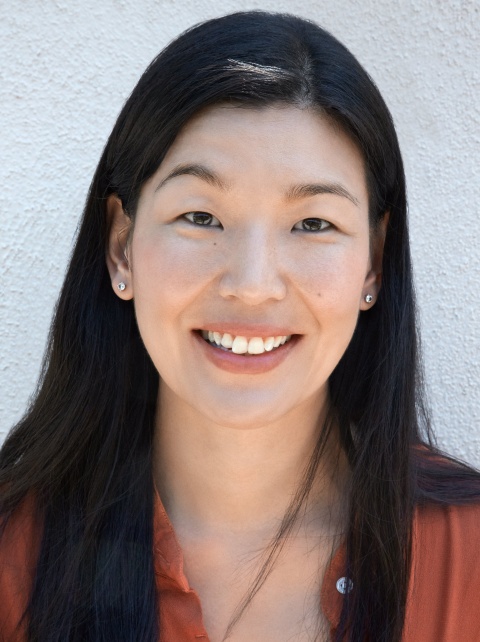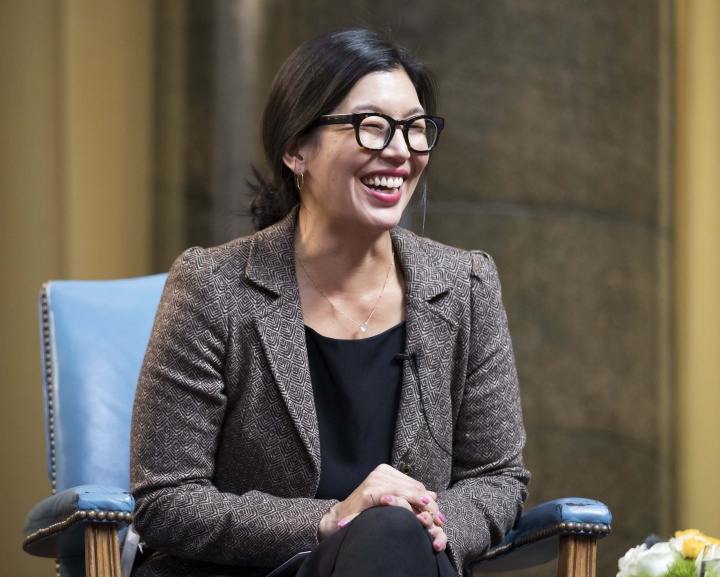Columbia College | Columbia University in the City of New York
Take Five with Ai-jen Poo ’96

MICHELE ASSELIN
What were you like when you arrived at Columbia?
I had just come from a year in art school and was ready to return to reading and writing. I had gone to boarding school for high school, so living on campus was not new — living in New York City and exploring everything it had to offer, however, was. I was especially drawn to activism in the city’s large and diverse Asian community. I started volunteering at a domestic violence shelter for Asian immigrant women, which then led me to organizing. In general, I was hungry to understand how to have an impact on the world. I signed up for every class on social change, feminism and movements for justice I could find. I wanted to experience life in the big city and be a positive force for change — Columbia allowed me to do both.
What do you remember about your first-year living situation?
My first year was spent in a studio apartment, about seven blocks from campus. I was happy to live alone after sharing a tiny dorm room in art school, and being off campus was exciting, too. I remember feeling free. I also remember feeling kind of isolated from other students at times. Looking back, I wish I had been more engaged with campus life — I’ve had the rest of my life to explore the city, but those years of building relationships through living with your peers on campus are irreplaceable. It wasn’t until senior year during the campaign for ethnic studies on campus that I felt connected to a community of students. The campaign took off in spring 1996: A coalition of Black, Latino and Asian students came together to push the administration to create a department for ethnic studies. We took over Hamilton Hall, engaged in a hunger strike and occupied Low Library. We were successful, eventually, in that we were able to establish the Center for the Study of Ethnicity and Race. I’m still in touch with many of the student leaders in that campaign. Many of us are still working for social justice.
What class do you most remember and why?
I remember Robert Thurman’s intro to Buddhism class, because it was one of my first big, lecture-style classes. It was also really fun and engaging; the reading list was phenomenal. It was a fascinating way to learn about the Asian political economy, particularly about the relationship between China and Tibet. But it probably comes to mind so immediately because I met one of my dearest friends in that class, Rachel Burk ’96, GSAS’01. She became my roommate and remains one of my favorite people in the universe. She married her high school boyfriend, who also went to Columbia, has two beautiful daughters and is one of the best, kindest human beings I’ve ever met.
I also remember the class on poetry writing with the great poet Nicholas Christopher. Long after I graduated, I looked for opportunities to take his classes. Even though I went to art school, it wasn’t until I took his class that I thought of myself as an artist. It was in his class that I learned that art, like Buddhism and community organizing, is a practice.
Did you have a favorite spot on campus, and what did you like about it?
My favorite spot was the East Asian Library. I loved it because it was a quiet place to read and work that was never too crowded, while centrally located. And also because someone I had an enduring crush on could often be found working there. I would never talk to him except to say hello in passing, but it was always a draw.
What, if anything, about your College experience would you do over?
I would take more economics and journalism courses. Working at the community level with low-wage workers, I have a unique view of their experiences in the economy. I think if I also had more grounding in economic theory, it would help me imagine the policy solutions that could address the barriers to opportunity for them. Or at least I could better argue with economists about what’s not working and why. And if I had some journalism courses under my belt, I think I could more effectively tell the stories of working people, to help create the context for good policy solutions. The Journalism School is such an invaluable resource.

Ai-jen Poo ’96 at the launch of the Eric H. Holder Initiative for Civil and Political Rights
BEN HIDER
More “Take Five”
- 1 of 32
- ›

